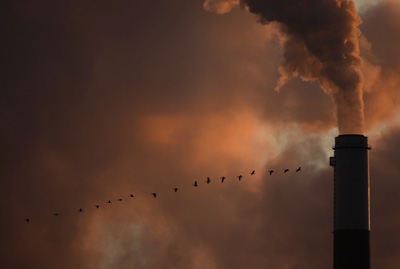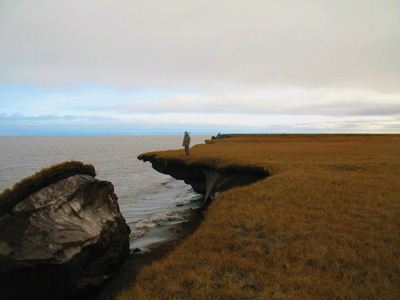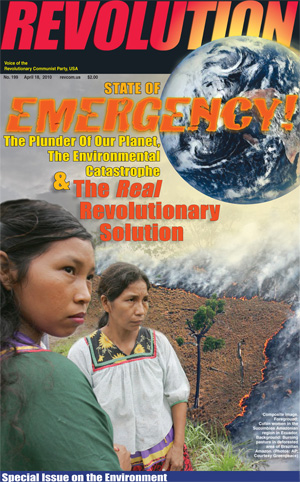I'm usually the first one to hate on the dirty smelly hippies, especially with their "pot will save the world" bullshit, but when it comes to the environment being destroyed rhetoric, they might just have a point. Where it falls apart, is when they advocate everyone growing food everywhere, and recycling everything as an ultimate solution. It is not. And it ignores the world's growing environmental destruction by the capitalist/imperialist bourgeoisie. Just because I throw a can into the recycling bin here, it does not negate the crap we all buy from Bangladesh or China over here. It does not mean we can ignore the rest of the world just because we smugly think we are actually accomplishing something. The ruling classes in every country need to be overthrown. They only give a fuck about money, and what they have to destroy in the process is irrelevant. Fuck them.

New UN Climate Panel Report:
This Criminal System Is Destroying Our Planet!
By Orpheus Reed | April 7, 2014 | Revolution Newspaper | revcom.us
On March 31 the Intergovernmental Panel on Climate Change (IPCC) released its latest report on the dangers of climate change, “Climate Change 2014: Impacts, Adaptation and Vulnerability.” This IPCC report is the second piece of its current report—the fifth assessment report published over the last 25 years.
With each report, the warnings of this panel get more alarming, the dangers clearer and the stakes higher. The 2014 report establishes that climate science as a whole has concluded that climate change is not a far off, abstract danger but is already impacting “natural and human systems on all continents and across the ocean.” The negative effects of climate change are hitting especially hard at the poor people and poor countries on this planet, who have done the least to cause the problem. It makes very clear that unless there are dramatic changes that happen very soon, there will be devastating and possibly even catastrophic impacts on the natural world and on human life from the warming of the planet and climate change.
For 25 years, the IPCC has warned the world of the danger to the climate. Despite all of these warnings, and against the opinions of 97 percent of the world’s climatologists and a growing mountain of shocking and extremely frightening studies done by smaller scientific teams (more later), nothing that matters a damn has been done by the world’s ruling powers to stop or even address this roaring emergency. We are truly on course for a climate and humanitarian disaster, and we must move now to change this course before it’s too late.
What the IPCC Summary for Policymakers Highlights
The impacts climate change is already causing in the world:
- Glaciers continue to shrink all over the planet, due to the planet warming. This is affecting water supplies for people in many regions.
- Climate change is warming and thawing permafrost in far northern regions. Permafrost is soil in layers that has been frozen two years or more, but much has been frozen far longer. Thawing of permafrost is very dangerous because it contains large quantities of frozen organic matter. So when it thaws, methane and carbon dioxide from this previously frozen matter is released into the atmosphere, further warming the planet.
- Many different species on land and sea are shifting their geographic ranges, migrations, and seasonal activities in response to climate change, and this is affecting the health of species and their interactions. The report says while climate change has so far been proven to have caused only a few recent extinctions of species, in the past more gradual, natural climate change caused big shifts in ecosystems and extinctions of species. This point raises the danger that as thing go forward, species extinction will become much worse.
- There are increasing human impacts from climate change—deaths from heat waves, floods, and cyclones, as well as impacts from increasing droughts and wildfires. These impacts are already interacting with and making social inequalities worse—hitting poor people and countries the hardest.
The increasing impacts and risks to come as climate change advances:
- The report says, “Increasing magnitudes of warming increase the likelihood of severe, pervasive and irreversible impacts.”
- The amount of the world’s people experiencing water scarcity in some regions or times, and on the other hand major river floods in other regions or times, will increase with continuing warming.
- There is increased risk of extinction of “a large fraction” of land and sea species, as climate change interacts with other environmental stresses.
- Sea-level rise will cause low-lying coastal areas to erode, flood, and in some cases be submerged.
- Climate change will cause a vast redistribution and reduction of ocean-living species causing a severe reduction in fisheries’ productivity.
- Ocean acidification, caused by carbon dioxide being taken up by the seas, poses big risks to life in the oceans, especially in the polar regions and coral reefs.
- Production of major food crops like wheat, rice, and maize will be negatively impacted in tropical and temperate regions. There are potentially huge risks to the global food supply if the world warms an additional 4 degrees Celsius (7.2 degrees Fahrenheit) or more. (At least 3-4 degrees Celsius increase and even more is what scientists are predicting if the current emissions path continues as it is.)
- All of this will hit the world’s poor people and countries hardest, and will make poverty worse. Poor people will disproportionately suffer and be impacted by heat stress, extreme rainfall, flooding, landslides, air pollution, drought, water scarcity, and lack of food.
- Climate change will increase the displacement of people and increase the risks of violent conflict—civil war and other “inter-group violence”—by making poverty and economic shocks worse.
The IPCC report also addresses possible ways to adapt to the transformations climate change is causing—things like ways to prevent the worst of storm surges from powerful hurricanes, flooding, etc. Such “adaptation,” to the extent it was attempted, would be highly unequal, given the huge gap between have and have-not countries in the world. But even more fundamentally, what is clear from this report as well as the picture from climate science in general is that no amount of adaptation can deal with the truly horrific impacts to come. What is needed are massive emergency efforts right now to STOP the emissions of greenhouse gases from burning fossil fuels and other causes, and to transform the entire energy foundation of human society. Reversing the environmental crisis requires revolution, and the battle now to STOP the devastation of the environment can and should contribute to and be increasingly linked to the overall movement for revolution. The conclusion one must make based on this report is one of a particularly horrific future for the vast majority of humanity—the poor and dispossessed in the oppressed countries of the world—already facing extreme struggles to eat, sometimes starving, suffering from disease and lack of clean water, health care, etc. All of this will be made unimaginably and likely even catastrophically worse if the current trajectory of the warming planet continues.
The IPCC Consensus and the Actual State of Things
Thousands of scientists from over 100 countries contribute to the IPCC reports. So the reports represent the overwhelming consensus of the world’s climate scientists based on a thorough review of scientific studies that have been peer-reviewed and published, from many converging streams of evidence. Because of the consensus—everyone has to agree on the final conclusions written in the report—these reports end up being a kind of “lowest common denominator” in describing impacts and dangers. Past IPCC reports have in certain respects underestimated the speed and level of climate impacts, particularly the speed of melting of Arctic ice. Climate scientists such as Michael Mann and Stefan Rahmstorf have pointed out that the IPCC represents an important consensus of climate reality and prediction but, if anything, tends to underestimate the level of future temperature and sea level rise. In an important interview with Michael Slate on KPFK, Mann talks about what the current report shows and comments on how striking it is that despite this built-in conservative pull, the report draws such stark conclusions.
Unfortunately, as stark as the reality the IPCC demonstrates is, the actual level of danger the world faces is very likely worse. This is especially so because of the reality that as the climate warms to certain levels, new dangerous processes can be unleashed that cause even greater and sometimes qualitatively more warming. The melting of permafrost and frozen methane in the oceans and the melting of polar ice are examples of these “positive” feedbacks that, when they certain levels, can reinforce warming further and can even cause larger qualitative changes to a different state—climate tipping points.
In 2012, climate blogger Joe Romm, a climate scientist and senior fellow at Center for American Progress, put together a summary of conclusions of many of the latest peer-reviewed scientific climate studies. In looking into just a few of these, the conclusions are beyond hair-raising.
Here are just a few things these studies found:

A flock of geese fly past a smokestack at the Jeffery Energy Center coal power plant near Emmett, Kansas. Photo: AP
- An article by Jeffrey Kiehl in Sciencemagazine in 2011 looked into “lessons from earth’s past.” Scientists can study past temperature and carbon dioxide (CO2) levels through various means. If global carbon levels continue to grow as they are over the next century, they are expected to reach between 900 and 1100 parts per million by century’s end. After examining evidence from past geologic ages, Kiehl found that the last time CO2 levels were this high was 30-100 million years ago and that temperature levels at that time were 16 degrees C (29 degrees F) higher than now on average. Kiehl concludes, “If the world reaches such concentrations of atmospheric CO2 positive feedback processes can amplify global warming beyond current modeling estimates.” In other words, given the same CO2 levels, past real world temperatures were actually worse than the most dire predictions of what Earth’s temperature in 2100 will be.
- The UK Met Office (Britain's national weather service) Hadley Centre for Climate Prediction and Research predicted in a study in 2006 that on current course, drought will impact 1/3 of the Earth’s land mass by 2100.
- A study in Nature magazine in 2010 found that over the past century, the ocean’s phytoplankton declined by 40%. The authors say they believe this has happened as a result of global warming causing rising sea temperatures. One of the co-authors, marine biologist Boris Worm, said, “I’ve been trying to think of a biological change that’s bigger than this and I can’t think of one. … Phytoplankton are a critical part of our planetary life support system. They produce half of the oxygen we breathe, draw down surface CO2 and ultimately support all of our fishes.”
Yet none of the evidence pointing to a catastrophic future if things continue as they are, is stopping the continual pumping out of greenhouse gases. Levels of carbon dioxide have already climbed to over 400 parts per million—levels not seen in all of human history. Not only are greenhouse gases continuing to build up, the rate of their build-up has increased! Instead of stopping this, the ruling classes of the dominant capitalist powers, who have a stranglehold on the world’s economy and political power, only accelerate the emergency.
It must be confronted by humanity that the stakes of this are, quite possibly, whether we as humans will be able to survive on this planet and whether most of the world’s species will also be driven out of existence. The trajectory we are on is one of catastrophic and horrific changes, changes that are accelerating and picking up momentum in ways we never would have imagined 20 or maybe even 10 years ago. But now these changes are upon us and threaten to spiral completely out of control.
When the IPCC report came out, U.S. Secretary of State John Kerry said, “The costs of inaction are catastrophic.” Yet he represents the world power most responsible historically for the build-up of CO2. Barack Obama vows to “act if Congress won’t” on climate change while building the U.S. up to be the world’s leading producer of oil and natural gas, and among the world leaders in coal production and export—the very materials whose burning is bringing this catastrophe. The U.S. and all the other capitalist powers wring their hands over the danger while they continue to be compelled by their system’s laws to race to find and burn even more destructive unconventional fossil fuels in their mind-numbing battle to outpace each other. All of this is beyond hypocrisy and cynicism—this is systemic, sickening destruction of everything.
The release of this report has provoked widespread expressions of concern and outrage—for millions, it has been a wake up and shake up call. And it should be. But far more people need to be woken up and shaken up! Given this I have some questions for people. Is what’s realistic to bury your head in the sand or only let in as much of the actual reality as you “can handle”? Is what’s realistic to expect that these capitalist criminals who are destroying the entire world and threatening to take us out of existence, are capable of stopping this? Or is what’s realistic to wake up and realize we need dramatic transformations that can only come from an actual revolution and a new socialist system—based on people being caretakers of the Earth and being mobilized to move heaven and earth to combat environmental disaster? This is our only real hope. Whether or not people agree with that, we have to come together, awaken humanity, and fight to stop these criminals from potentially taking us and most of our natural world out of existence.




